Related Research Articles
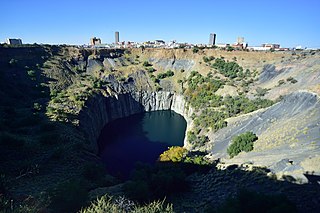
Kimberley is the capital and largest city of the Northern Cape province of South Africa. It is located approximately 110 km east of the confluence of the Vaal and Orange Rivers. The city has considerable historical significance due to its diamond mining past and the siege during the Second Anglo-Boer war. British businessmen Cecil Rhodes and Barney Barnato made their fortunes in Kimberley, and Rhodes established the De Beers diamond company in the early days of the mining town.
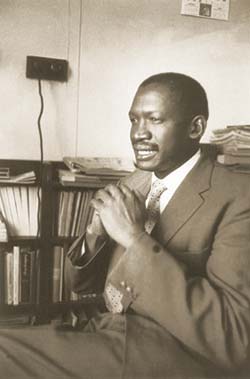
Robert Mangaliso Sobukwe OMSG was a South African anti-apartheid revolutionary and founding member of the Pan Africanist Congress (PAC), serving as the first president of the organization.

Fatima Meer was a South African writer, academic, screenwriter, and prominent anti-apartheid activist.
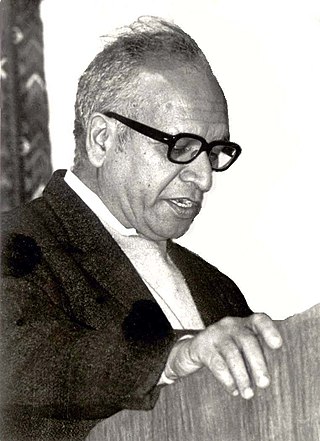
Bipan Chandra was an Indian historian, specialising in economic and political history of modern India. An emeritus professor of modern history at Jawaharlal Nehru University, he specialized on the Indian independence movement and is considered a leading scholar on Mahatma Gandhi. He authored several books, including The Rise and Growth of Economic Nationalism.
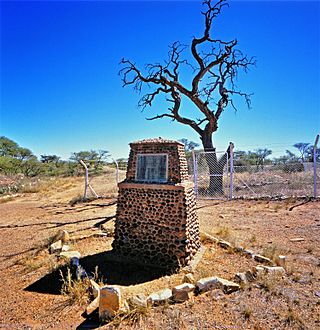
Barkly West is a town in the Northern Cape province of South Africa, situated on the north bank of the Vaal River west of Kimberley.

Aijaz Ahmad was an Indian-born American Marxist philosopher, literary theorist, and political commentator. He was the Chancellor's Professor at the University of California, Irvine School of Humanities’ Department of Comparative Literature.

The McGregor Museum in Kimberley, South Africa, originally known as the Alexander McGregor Memorial Museum, is a multidisciplinary museum which serves Kimberley and the Northern Cape, established in 1907.
Phakamile Mabija was an African anti-Apartheid activist who died while in police custody in 1977.
Wildebeest Kuil Rock Art Centre is a rock engraving site with visitor centre on land owned by the !Xun and Khwe San situated about 16 km from Kimberley, Northern Cape, South Africa. It is a declared Provincial Heritage Site managed by the Northern Cape Rock Art Trust in association with the McGregor Museum. The engravings exemplify one of the forms often referred to as ‘Bushman rock art' – or Khoe-San rock art – with the rock paintings of the Drakensberg, Cederberg and other regions of South Africa being generally better known occurrences. Differing in technique, the engravings have many features in common with rock paintings. A greater emphasis on large mammals such as elephant, rhino and hippo, in addition to eland, and an often reduced concern with depicting the human form set the engravings apart from the paintings of the sub-continent.
The concept of the Northern Cape as a distinct geo-political region of South Africa coalesced in the 1940s when a "Northern Cape and Adjoining Areas Regional Development Association" was formed and the first map featuring the name "Northern Cape" was published. The geographic spread to which the term applied was not fixed until 1994, however, when it attained precise definition as the Northern Cape Province, one of South Africa's nine post-apartheid provinces. Since then there have been boundary adjustments to include parts of the former Bophuthatswana adjacent to Kuruman and Hartswater. Vryburg and Mafikeng, in the north eastern extremity of the former Cape Province - and hence regarded as part of the pre-1994 "Northern Cape" - are excluded, being part, now, of the North West Province in the North.
The Malay Camp in Kimberley, South Africa, was a cosmopolitan suburb which was subject to forced removals prior to the Group Areas Act.
Frances Goitsemang Baard OMSS OLG was a South African trade unionist, organiser for the African National Congress Women's League and a Patron of the United Democratic Front, who was commemorated in the renaming of the Diamantveld District Municipality (Kimberley) as the Frances Baard District Municipality. Schoeman Street in Pretoria was also renamed in her honour. This heroine is the reason we celebrate National Women's Day today in South Africa.
Maria Wilman was a South African geologist and botanist. She was the first Director of the McGregor Museum in Kimberley, South Africa and the second female South African to attend the University of Cambridge in England.
John Hyacinth Power was the second Director of the McGregor Museum in Kimberley, South Africa.
Lucien van der Walt is a South African writer, professor of Sociology and labour educator. His research engages the anarchist/syndicalist tradition of Mikhail Bakunin and Peter Kropotkin; trade unionism and working class history, particularly in southern Africa; and neoliberal state restructuring. He currently teaches and researches at Rhodes University in the Eastern Cape, South Africa, and previously worked at the University of the Witwatersrand. His 2007 PhD on anarchism and syndicalism in South Africa in the early 1900s won both the international prize for the best PhD dissertation from the Labor History journal, and the Council for the Development of Social Science Research in Africa prize for best African PhD thesis.

The Sol Plaatje University, which had provisionally been referred to as the University of the Northern Cape, opened in Kimberley, South Africa, in 2014, accommodating a modest initial intake of 135 students. The student complement is expected to increase gradually towards a target of 7 500 students by 2024. Launched in a ceremony in Kimberley on 19 September 2013, it had been formally established as a public university in terms of Section 20 of the Higher Education Act of 1997, by way of Government Notice 630, dated 22 August 2013. Minister of Higher Education and Training, Blade Nzimande, observed at the launch that this “is the first new university to be launched since 1994 and as such is a powerful symbol of the country’s democracy, inclusiveness, and growth. It represents a new order of African intellect, with a firm focus on innovation and excellence." Previously announcing the name for the university, on 25 July 2013, President Jacob Zuma mentioned the development of academic niche areas that did not exist elsewhere, or were under-represented, in South Africa. "Given the rich heritage of Kimberley and the Northern Cape in general," Zuma said, "it is envisaged that Sol Plaatje will specialise in heritage studies, including interconnected academic fields such as museum management, archaeology, indigenous languages, and restoration architecture." Prof Andrew Crouch took over the helm on 1 April 2020 after the term of founding Vice-Chancellor, Prof Yunus Ballim came to a close.
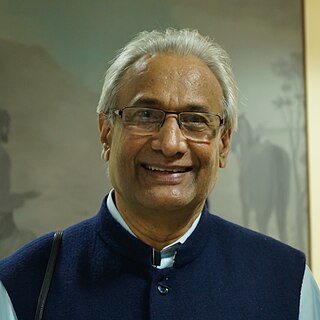
Bhagwan Singh Josh is an Indian historian, specialising in social and political history of modern India. He is Professor of Contemporary History at the Centre for Historical Studies, Jawaharlal Nehru University, New Delhi. He is one of the project committee members of the Europe–South Asia Maritime Heritage Project. He has also been co-director of the Indian Council of Social Science Research (ICSSR) project, History of the Indian National Congress, 1885–1947. He has specialized on the Indian national liberation movement and is considered to be one India's foremost scholars on communist movements in India. His best known book is Struggle for Hegemony in India which combines the various perspectives of India's history—the colonial state, the various political parties, the trade unions, and the mobilization of the work force—to form a cohesive whole on the basis of Antonio Gramsci's hegemonic concepts.

Christopher Pinney is an anthropologist and art historian, and Professor of Anthropology and Visual Culture at University College London in the department of anthropology. He is known for his studies on the visual culture of South Asia, specifically India. He was honoured by the Government of India, in 2013, by bestowing on him the Padma Shri, the fourth highest civilian award, for his contributions to the field of literature.
Radwan or Redwan or Ridwan is a given name and a surname. Notable people with the name include:

Constance Georgina Adams, also known as Constance Georgina Tardrew, was a South African housewife and collector of botanical specimens. Known by the nicknames Connie and Daisy, Adams was born in Cape Town and spent her early childhood on a farm in Tulbagh before moving to Warrenton. She subsequently lived in Kimberley before getting married, settling in Johannesburg where she became active in the Housewives League of South Africa. Inspired by her parents' interest in botany, she became a successful collector for both the Albany Museum in Grahamstown and McGregor Museum in Kimberley. She also cultivated a friendship with the Director of the latter, Maria Wilman. She collected over 240 specimens, which were presented to the Albany Museum, McGregor Museum and the National Herbarium in Pretoria.
References
- ↑ McGregor Museum Report: Profile on Professor Ridwan Laher, Principal Historian. The history of the liberation struggle in the Northern Cape, pp 94-102
- ↑ "The Indigenist News Newswire | Inteligenta Indigena Novajoservo". La Inteligenta Indigena Novajoservo. Retrieved 14 November 2017.
- ↑ Interview with Ridwan Laher
- ↑ McGregor Museum Report: Profile on Professor Ridwan Laher, Principal Historian. The history of the liberation struggle in the Northern Cape, pp 94-102
- ↑ "Fatima and Ahmed's Son". www.ridwanlaher.blogspot.com. Retrieved 14 November 2017.
- ↑ "Fatima and Ahmed's Son". www.ridwanlaher.blogspot.com. Retrieved 14 November 2017.
- ↑ "The Indigenist News Newswire | Inteligenta Indigena Novajoservo". La Inteligenta Indigena Novajoservo. Retrieved 14 November 2017.